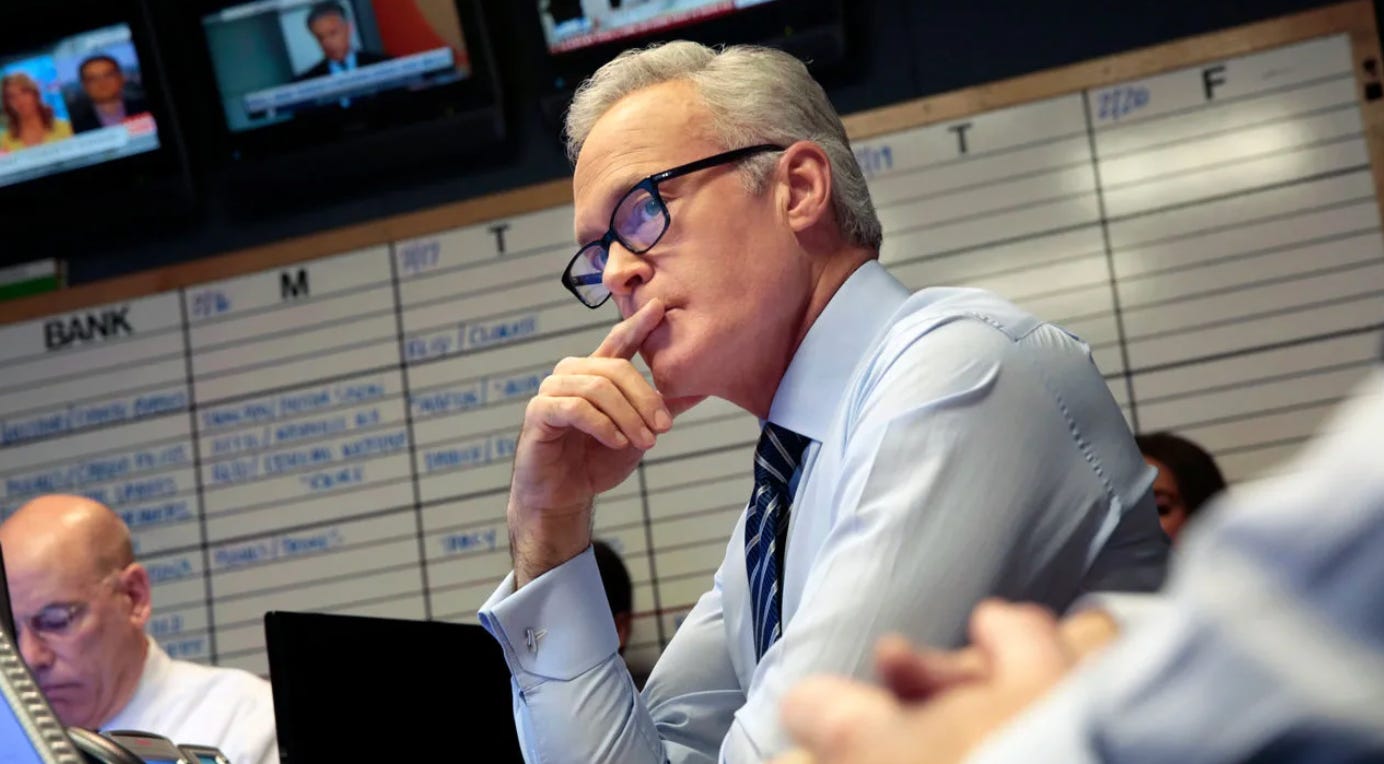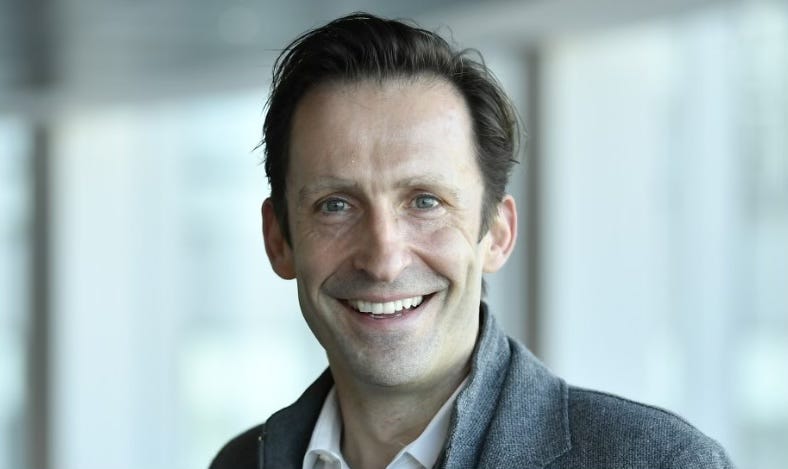Issue № 134 | London, Sunday 4 May 2025
Read on to learn why:
① Celebrity cachet should be matched with deep expertise.
② A celebrity is only a marketing asset if content, culture and continuity align.
③ Private equity is emerging as compelling, risky, and more accessible than ever.
④ It’s junior bankers, not marketers, who should fear AI most.
⑤ Journalism without fear or favour is more vital than ever.
⑥ Wall Street’s most unusual remote work experiment is over and discredited.
⑦ Stablecoins are about to explode.
What's new
Pro-golfer Rory McIlroy is getting into private equity, reports The New York Times.

In short:
“Fresh off finally securing a career grand slam with a thrilling win at the Masters, Rory McIlroy, the world’s second-ranked golfer, is rounding out another corner of his life: investing. Mr. McIlroy’s investment firm, Symphony Ventures, is teaming up with the private equity firm TPG to start TPG Sports, an investment fund that will place bets on businesses across the sports industry.”
“Mr. McIlroy’s increasing immersion in business is not uncommon among golf’s greats; Tiger Woods, Greg Norman and Jack Nicklaus have all built big business portfolios around golf and beyond. But his partnership with TPG comes as record dollars are flowing into sports. Competition by media companies over premium live content has driven up valuations of traditional teams and created demand for new ones.”
“TPG manages more than $200 billion in assets and has extensive experience in the media industry, which is increasingly entwined with sports. Among those deals are DirecTV and Creative Artists Agency. Mr. McIlroy brings a different sort of experience. As a former member of the influential PGA Tour Policy Board, he was briefly on the front lines of deal talks between the PGA Tour and the Saudi sovereign wealth fund. He stepped down in 2023 to focus on golf, his family — and his growing investing portfolio.”
Why it matters
McIlroy’s victory at the Masters and the news of his partnership with TPG came the same week that, here in the UK, the Treasury Committee held a session on the role and regulation of online financial influencers, or finfluencers. The two stories felt incongruous to me. While the latter illustrates the dangers of taking investment advice from celebrities, the former matters as an example of specialist knowledge being applied to investment decisions.
① There’s no suggestion that TPG was swayed by McIlroy’s celebrity - nor indeed that its investors will be. But there’s also no denying its allure. Having a professional golfer of his fame advising on investments in the sports industry carries a certain cachet. And that’s okay because his celebrity is matched by his deep and niche expertise.
This is in sharp contrast to the finfluencer phenomenon. As these self-declared celebrities continue to gain traction, the FCA is taking notice and ramping up its efforts to protect investors. In July 2023, it announced plans to revamp its social media guidance, updating rules to reflect modern digital marketing trends. It has also interviewed 20 finfluencers under caution for potentially breaching financial promotion rules. Investment Week reports that “the watchdog issued 38 alerts regarding illegal financial promotions and took action against more than 10,000 misleading adverts in 2023, a sharp increase from 8,500 in 2022.”
What to do about it
Take action
② A celebrity on your bench - regardless of the field in which they made their name - can be a powerful marketing asset. Your challenge is to ensure that they are credible on that bench, that they’re there because of their expertise. When evaluating partnerships consider:
Content: Is their specialist knowledge and experience the right fit for your product or investment strategy? Will they add or detract from your focus?
Culture: Are they aligned with your firm’s values and culture?
Continuity: Will this make sense for the long-term? Avoid the appearance of short-lived gimmicks.
Get help
Two ways I can help you: 1) hire me as a full-time member of your team; or 2) use InMarketing, an advisory service for senior leadership teams in finance and tech.
🔎 Audit 🧭 Strategy 🖋️ Positioning ✅ Planning 🤷🏻 Problem-solving ☎️ Counsel
Top stories
The other articles that are worthy of your time.
FINANCIAL SERVICES
The risky world of private assets opens up to retail investors
③ Private equity is emerging as compelling, risky, and more accessible than ever.

“Private markets [are] the most exciting corner of the investing universe, with trillions of dollars flowing into private equity, venture capital and private debt. Private assets under management, which also include infrastructure and property funds, have surged to $24trn, from $10trn a decade ago.”
“Now private-markets firms are dreaming of getting even bigger—by luring in the investing masses. […] But there are good reasons why private assets have long been the preserve of a select few. […] The most fundamental difficulty is that private assets are largely illiquid. Whereas stocks and bonds are traded all day long, stakes in private funds change hands only very rarely. Would-be buyers are scarce; working out a price is hard. Transactions, when they do happen, are not public so history can hardly serve as a guide. All this means retail investors cannot simply pile in and out of private assets at will, as they might with other parts of their portfolios. This is a problem new products are finding hard to solve.”
“For a long time the democratisation of private markets, though much talked about, remained elusive. Now at last the winds of financial innovation and regulatory change are blowing in the right direction. But as they entice more retail savers, private-fund managers will come under greater scrutiny. Working around the illiquidity of the asset class is hard, and it may even be dangerous to try. In the event that new products disappoint or trap people’s savings, a backlash could ensue. The potential prize is huge. But catering for the investing masses is a risky business, too.”
TECHNOLOGY
Meet your new investment banker: an AI chatbot
④ It’s junior bankers, not marketers, who should fear AI most.
“An AI start-up behind a chatbot that replicates an investment banker has raised $50mn from a group of investors led by Thrive Capital, increasing the four-year-old company’s valuation from $80mn to $350mn. Rogo secured the capital from Joshua Kushner’s venture capital firm, a key backer of OpenAI, as part of a series B financing just seven months after the company’s previous $18.5mn fundraising round closed.”
“Rogo was developed by a former analyst at Lazard, Gabriel Stengel, with the aim of automating some of the laborious tasks done by junior investment bankers. It could quickly understand a company’s market position and competitors as well as pull basic valuation comparisons, he said, and had been deployed at investment banks Moelis and Nomura as well as investment firms Tiger Global and GTCR.”
“Banks and trading firms are already engaged in a technology arms race, with multibillion-dollar technology budgets to deploy in developing their own applications. JPMorgan Chase has rolled out an in-house large language model for employees, while private capital firms have developed their own AI models for assessing buyouts. Rogo also faces competition from other start-ups such as Mosaic, which is able to calculate deal returns from a few quick manual inputs.”
MEDIA & MARKETING
For media companies, news is becoming a toxic asset
⑤ Journalism without fear or favour is more vital than ever.

“As American politics has become polarised and, with Mr Trump’s return, vindictive, news organisations that were once seen as crown jewels in their owners’ portfolios are increasingly viewed as liabilities.”
“None of this has encouraged new media companies to add news to their output. Netflix, the all-conquering streamer, has marched into every genre, from live comedy to sport, but drawn the line at news. Apple tv+ ended its deal with a satirist, Jon Stewart, in 2023 after his political material became uncomfortable. Amazon produced an election-night show last year, but the only political content on its slate since then has been a $40m documentary about the first lady, Melania Trump.”
“What of the older media empires that already have legendary news brands? Some appear to be readying them for sale, as part of a broader separation of their streaming and so-called linear-tv assets. In November Comcast said it would spin off its cable-tv interests, including msnbc. In December Warner Bros Discovery restructured to separate streaming from its linear assets, including cnn. Disney’s boss, Bob Iger, has mused that linear networks like abc “may not be core to Disney”, though he later rowed back. Rumours swirl that Fox News might be sold, given Rupert Murdoch’s failure so far to win control of the family trust from his children.”
WILDCARD
Citi del Sol: How the party ended for Wall Street bank’s Málaga experiment
⑥ Wall Street’s most unusual remote work experiment is over and discredited.

“In 2022, as junior investment bankers complained of burnout from a record-breaking dealmaking boom, Citigroup had a solution for bringing in and retaining new talent: a better work life balance working in Spain’s Costa del Sol. The US bank hired 27 analysts to work from a newly opened office in Málaga, promising eight-hour days and free weekends. Citi’s rivals labelled it a publicity stunt that would do little to change the culture on Wall Street.”
“Less than three years later, the office is closed and most staff moved to London. A handful of employees have been let go as the sun sets on an initiative designed to break from the traditional working conditions faced by the junior analysts who do much of the grunt work in investment banking.”
“Former employees who worked in Citi’s Málaga office, as well as those involved in the project, say the reality differed to the bank’s pitch, with many working long hours in the hopes of earning coveted roles in cities such as London and Paris.”
Off cuts
The stories that almost made this week’s newsletter.
FINANCIAL SERVICES
💷 How Britain’s banking revolution failed
📉 London Stock Exchange Group: Equity arm continues to lose relevance
📊 Profits: Lloyds down, NatWest and Barclays up
📈 KKR and Capital Group seek to lure investors to private markets
👋 HSBC chairman Mark Tucker to retire after eight-year tenure
TECHNOLOGY (this week, it’s all about stablecoins)
🪙 Stablecoins could reach $3.7 trillion by 2030 says Citi
🪙 Innovate Finance proposes the UK becoming ”Eurodollar market” for stablecoins
🪙 How stablecoins shake up the financial 'super app' battle
🪙 How Visa and Mastercard are building stablecoin businesses
🪙 Stripe opens testing for new stablecoin product
MEDIA & MARKETING
📲 Social media publishing as a tool for content marketing distribution
🦾 Mark Zuckerberg says ads will soon be handled entirely by AI
🧵 Threads tops 350M monthly users after adding 30M in the quarter
🪦 Are we witnessing the slow death of advertising holding companies?
The last word
⑦ Mathew McDermott, Head of Digital Assets at Goldman Sachs, on what will drive institutional adoption of digital currencies:

“If regulations allow stablecoins to be easily adopted by financial institutions, this could accelerate the use of digital currency by big players. We’re watching very closely.”
Don’t settle for marketing.
Aspire to InMarketing.
Wishing you an influential week,
P.S. Do you enjoy a martini like I do? Perhaps you’re an economist at heart.





